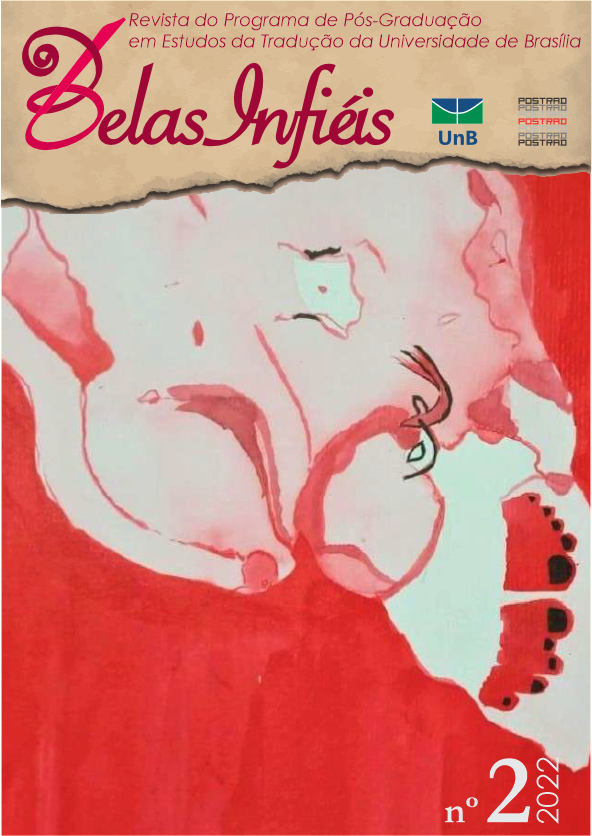Estrategias Globales de Adaptación Teatral: Feminismos en Escena en la Traducción de The Vagina Monologues
DOI :
https://doi.org/10.26512/belasinfieis.v11.n2.2022.42336Mots-clés :
Adaptación. Traducción teatral. Escritura del cuerpo. Monólogo. Intervención.Résumé
The Vagina Monologues es una obra de teatro estrenada en 1996 que se convirtió en un ícono teatral del movimiento feminista a nivel internacional, ya que explora la sexualidad femenina y denuncia la violencia contra las mujeres. El presente trabajo aborda la traducción y adaptación de la pieza teatral mediante un análisis comparativo del libreto en inglés frente a dos representaciones en español, una realizada en España y la otra en México. Esta investigación tiene como objetivo proponer una categorización de estrategias globales de adaptación teatral, basada en la clasificación de los recursos utilizados en ambas adaptaciones para apelar a un público regional específico. El análisis se apoya en diversos estudios en el campo de la traducción teatral, principalmente en el trabajo del traductólogo español Julio-César Santoyo, y está abordado desde un enfoque feminista, con base en las teorías de la investigadora cubana Yanetsy Pino Reina. Este trabajo se propone llevarnos a repensar la labor traductora como motor de cambio en espacios artísticos y movimientos sociales.
Téléchargements
Références
Castro, Olga & Spoturno, María Laura. (2020). Feminismos y traducción: apuntes conceptuales y metodológicos para una traductología feminista transnacional. Mutatis Mutandis. Revista Latinoamericana de Traducción, 13(1), 11–44. https://revistas.udea.edu.co/index.php/mutatismutandis/article/view/340988
de Toro, Fernando (1987). Texto, texto dramático y texto espectacular. Semiosis, (19), 101–128. https://cdigital.uv.mx/handle/123456789/6330
Egido, Aurora. (1989). La escenografía del teatro barroco. Universidad de Salamanca.
Ensler, Eve. (2004). The Vagina Monologues, Official guidelines and script for the V-Day 2004 College Campaign. Dramatists Play Service.
Fobbio, Laura. (2009). El monólogo dramático: interpelación e interacción. Comunicarte.
Lapeña, Alejandro. (2014). Recalificar el páramo. Bases para un nuevo modelo traductológico de análisis del texto teatral. Revistas de la Universidad de Granada, 25, 149–172. https://revistaseug.ugr.es/index.php/sendebar/article/view/650/2672
Matarredona, Jaime. (2 de febrero de 2019). Entrevista con el director. (Autora, Entrevistador)
Merriam-Webster. (s.f.). learnersdictionary.com. https://www.learnersdictionary.com/definition/cunt
Moscatel, Susana & Merino, Erick. (2019, enero 28). Los monólogos de la vagina. (Jaime Matarredona, Dirección) Teatro Libanés, Ciudad de México, México.
Pino Reina, Yanetsy. (2018). Hilando y deshilando la resistencia (pactos no catastróficos entre identidad femenina y poesía). Fondo Editorial Casa de las Américas.
Plata, Anna. (enero de 2002). Los monólogos de la vagina, de Eve Ensler. Planeta.
Real Academia Española. (s.f.). Diccionario de la lengua española. https://dle.rae.es/co%C3%B1o
Roca, José María. (enero de 2016). Los monólogos de la vagina. (José María Roca, Dirección) Palacio de los Marqueses de la Algaba, Sevilla. https://www.youtube.com/watch?v=3WoI0tVrGQ8&t=4120s
Santoyo, Julio-César. (1989). Traducciones y adaptaciones teatrales: ensayo de tipología. Cuadernos de teatro clásico, (4), 95–112. https://biblioteca.org.ar/libros/141547.pdf
V-Day. (2021). V-Day: Until the Violence Stops. https://www.vday.org/about-v-day/
Téléchargements
Publié-e
Comment citer
Numéro
Rubrique
Licence
(c) Tous droits réservés CC BY 2022

Cette œuvre est sous licence Creative Commons Attribution 4.0 International.
Copyright Statement
Given the public access to this journal, the texts are free to use but requires the recognition of the original authorship and initial publication in this journal to be properly stated.
The journal allows the use of works published for non-commercial purposes, including the right to submit the work to publicly accessible databases. Published contributions are the sole and exclusive responsibility of the author(s).
- When submitting papers to be evaluated by the Belas Infiéis journal, the author(s):
- Declare that the contents of the contributions are original and of their original creation, being entirely responsible for their content if there is an objection by third parties.
- Claim to be aware that they should not commit academic plagiarism.
- Declare that the manuscript has not been published, completely or partially, in Portuguese or another language. If it is a translation it should be submitted to the Translated Articles section.
- Declare that the manuscript is not being evaluated by other journals.
- Declare that the manuscript was not submitted to another journal simultaneously.
- Commit(s) to inform the journal of any kind of error or inaccuracy in their contribution (published, in evaluation or in editing) and to collaborate with the editors to make due corrections of the article (when in evaluation or editing) or erratum/retraction (after publication).
- Declare that there is no conflict of interest regarding the published work.
- Authorize its release if it is accepted for publication without any kind of monetary compensation.
- Agree to assign non-exclusive rights to publication to the magazine, remaining free to make their contribution available in other media as long as the publication of the first version in Belas Infiéis magazine is mentioned. They also authorize Belas Infiéis to assign their texts for reproduction in content indexers, virtual libraries and similar platforms.
- Maintain copyright and grant the journal the right of first publication, the work being licensed under theCreative Commons Attribution License.
- Is/Are allowed and encouraged to publish and distribute their work online after the editorial process, which may increase the impact and citation of the published work.
- Authorize the editorial team to make textual adjustments and to adapt the article to the publication rules, when necessary.



















